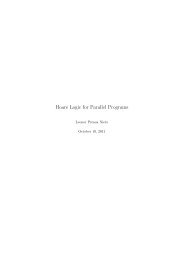Tutorial on Isabelle/HOL
Tutorial on Isabelle/HOL
Tutorial on Isabelle/HOL
You also want an ePaper? Increase the reach of your titles
YUMPU automatically turns print PDFs into web optimized ePapers that Google loves.
32 3. More Functi<strong>on</strong>al ProgrammingThe simplifier does not split case-expressi<strong>on</strong>s, as it does if-expressi<strong>on</strong>s, becausewith recursive datatypes it could lead to n<strong>on</strong>terminati<strong>on</strong>. Instead, thesimplifier has a modifier split for adding splitting rules explicitly. The lemmaabove can be proved in <strong>on</strong>e step byapply(simp split: list.split)whereas apply(simp) al<strong>on</strong>e will not succeed.Every datatype t comes with a theorem t.split which can be declaredto be a split rule either locally as above, or by giving it the split attributeglobally:declare list.split [split]The split attribute can be removed with the del modifier, either locallyapply(simp split del: split_if)or globally:declare list.split [split del]Polished proofs typically perform splitting within simp rather than invokingthe split method. However, if a goal c<strong>on</strong>tains several if and caseexpressi<strong>on</strong>s, the split method can be helpful in selectively exploring theeffects of splitting.The split rules shown above are intended to affect <strong>on</strong>ly the subgoal’sc<strong>on</strong>clusi<strong>on</strong>. If you want to split an if or case-expressi<strong>on</strong> in the assumpti<strong>on</strong>s,you have to apply split_if_asm or t.split_asm:lemma "if xs = [] then ys ≠ [] else ys = [] =⇒ xs @ ys ≠ []"apply(split split_if_asm)Unlike splitting the c<strong>on</strong>clusi<strong>on</strong>, this step creates two separate subgoals, whichhere can be solved by simp_all:1. [[xs = []; ys ≠ []]] =⇒ xs @ ys ≠ []2. [[xs ≠ []; ys = []]] =⇒ xs @ ys ≠ []If you need to split both in the assumpti<strong>on</strong>s and the c<strong>on</strong>clusi<strong>on</strong>, use t.splitswhich subsumes t.split and t.split_asm. Analogously, there is if_splits.!!The simplifier merely simplifies the c<strong>on</strong>diti<strong>on</strong> of an if but not the then orelse parts. The latter are simplified <strong>on</strong>ly after the c<strong>on</strong>diti<strong>on</strong> reduces to Trueor False, or after splitting. The same is true for case-expressi<strong>on</strong>s: <strong>on</strong>ly the selectoris simplified at first, until either the expressi<strong>on</strong> reduces to <strong>on</strong>e of the cases or it issplit.3.1.10 TracingUsing the simplifier effectively may take a bit of experimentati<strong>on</strong>. Set theProof General flag <strong>Isabelle</strong> > Settings > Trace Simplifier to get a better ideaof what is going <strong>on</strong>:
















